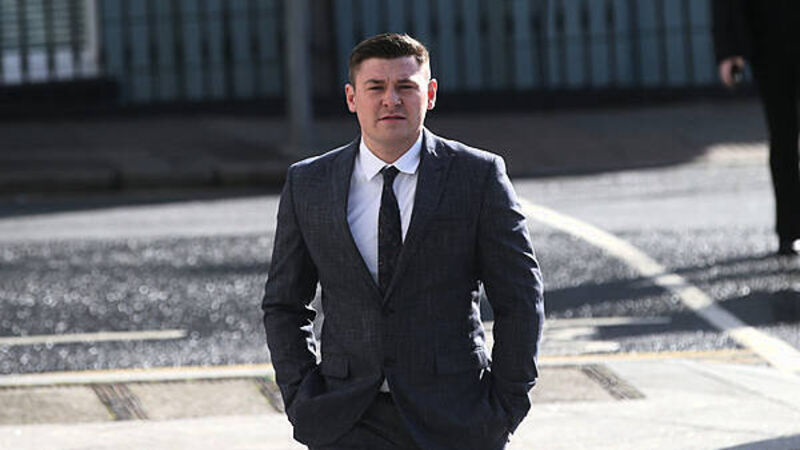Two gang rapists argue issues of consent in conviction appeals

Ryan Dunne
Two of three men jailed for the gang rape of a vulnerable teenager who had recently left State care have launched appeals against their convictions, arguing issues of consent were relevant during their trial.
At the Court of Appeal on Thursday, counsel for Dion Genockey (26) argued that the trial judge should have advised the jury that the appellant may have had reasons for not mentioning to gardaí that he believed the victim had given her consent.
Counsel for Daryl Rooney (27), meanwhile, argued that the appellant was not aware that the woman had not given her consent.
Genockey, of Clarion Quay Apartments, and Rooney, of Railway Street, Dublin City Centre, were convicted of raping the woman at Bull Island, Dollymount, Dublin, on January 5th, 2016, following a second trial at the Central Criminal Court in March 2022.
The jury in the first trial, which was held in 2020, was unable to reach a verdict.
Genockey was sentenced to nine years by Mr Justice David Keane while Rooney was sentenced to 10 years.
A third accused, Troy Ryan of Lower Gardiner Street, Dublin City Centre, was also convicted and sentenced to nine and a half years.
The sentencing court heard none of the men accepted the verdict of the jury and maintained their innocence.
Launching an appeal against conviction, counsel for Genockey, Thomas O’Malley SC said that his client had given evidence during the trial that there was consent on the part of the complainant, but he had not mentioned this in his interviews with gardaí.
Mr O’Malley referenced section 19A of the Criminal Justice Act 1984, which states that if a person charged with an offence fails to mention any fact relied on in their defence, being a fact which in the circumstances called for an explanation when questioned, then the court may draw inferences from this failure, and the failure may be treated as capable of amounting to corroboration of evidence.
Mr O’Malley said that one factor to be considered is the circumstances the accused person finds themself in. He said that Genockey was advised by his father not to mention anything to gardaí, which in this case turned out to be his defence.
Mr O’Malley went on to say that his client had a difficult relationship with one of the gardaí, who had allegedly called the appellant “a rapist”.
Given the appellant’s age at the time and the fact he was under the influence of his father, these were factors to be taken into account when interpreting section 19A, said Mr O’Malley.
Counsel submitted that the trial judge ought to have said to the jury that they had to consider the possibility that Genockey may have had reasons for not mentioning to gardaí that he believed the woman had consented.
Counsel for Rooney, Dominic McGinn SC said that for a rape conviction, the prosecution must prove the act, the absence of consent, and the fact that the accused person knows there is an absence of consent.
In this case, said counsel, the third aspect was lacking. Mr McGinn said that the complainant said she was not interested in sexual activity, but when Rooney was alone with her in the car, she did not say anything.
Ms Justice Isobel Kennedy said that while the defence was relying on an honest belief, this belief must be founded in reality.
“Where is the counter evidence? The evidence was all going the one way, as she said she did not consent,” said Ms Justice Kennedy.
Mr McGinn replied that the complainant had changed her mind about getting into the car with the men, which made Rooney “alive to the fact she was a young woman who could change her mind”.
“By time he got into the car, he knew two others had had sexual relations with her,” said Mr McGinn.
He said that in her evidence, the complainant said she made it clear to the first two men that she was not consenting, but Rooney was not aware of that.
He said that by the time Rooney got into the car, he was handed a prophylactic by one of the others, while the woman did not say anything, so he was not aware that she was not consenting.
On behalf of the State, Eilis Brennan SC pointed out that it was the prosecution case that this was a very vulnerable lady addicted to tablets, who was targeted by the men. They lured her away in a car, even though she told them she did not want to have sex, and took her to a remote location.
She said it was the defence case that the complainant approached the men, that she had lubrication, that she wanted to stay in their house, and she consented to having sex. Ms Brennan said this was an issue to go to the jury.
Concerning Rooney’s claim that he did not know the woman had not consented, Ms Brennan said that an honest belief is subjective, but there must be some reality to it, so there was ample evidence for the matter to go to a jury.
Concerning Mr O’Malley’s submission on the section 19A matter, Ms Brennan said the trial judge was very careful on this issue. She said the jury was told to look into all the facts, including Genockey’s age, the fact that he was with his father, and the fact that he hated one of the gardaí.
She said the trial judge linked his failure to mention his defence to these facts, so the judge’s direction to the jury was impeccable.
Mr Justice Patrick McCarthy, presiding over the three-judge court, said the court would reserve judgement in the case.
During the men's trial, evidence was heard that on the day in question, the young woman, who had recently left State care, travelled to Dublin to meet with friends. Later that evening, she purchased some Xanax pills and then went to an internet cafe.
While there, she was approached by a boy and told that the three teenagers, who she had never met before, wanted to talk to her. The men told her they wanted to bring her for a “quick spin”.
The woman initially declined but eventually agreed and left the cafe with Ryan and Rooney to get into a car outside, which was driven by Genockey.
The men drove out to Clontarf and down to the end of the wooden bridge at Dollymount Strand where they stopped by a shelter. Genockey then asked the woman: “Are we going to have some fun?”
The woman replied no, she didn't want to and had only wanted to go for a short drive, but the men were “refusing to listen”, the court heard.
Genockey and Rooney got out of the car and stood in the shelter while Ryan produced a condom from a stash in the glove box of the car and proceeded to rape the woman. When he was finished, Genockey got in and put a condom on.
Genockey tried to “sweet talk” the woman, the court heard and said he wasn't going to hurt her, before he proceeded to rape her.
Genockey then handed a condom to Rooney who raped the woman. At this stage, the woman “didn't even get a chance to say no”. It was “three against one” and she didn't have a choice, the court heard.
The trial heard her door had a child lock on it and she could not get out of the car.
The woman was told another person was going to pick her up and bring her home and the men left the scene quickly. Another car arrived containing three men and she was raped by two of the men in this car. She said that the men all got into the car afterwards, laughed and drove away, leaving her in the middle of nowhere.
If you have been affected by any of the issues raised in this article, you can call the national 24-hour Rape Crisis Helpline at 1800-77 8888, access text service and webchat options at drcc.ie/services/helpline/ or visit Rape Crisis Help.









